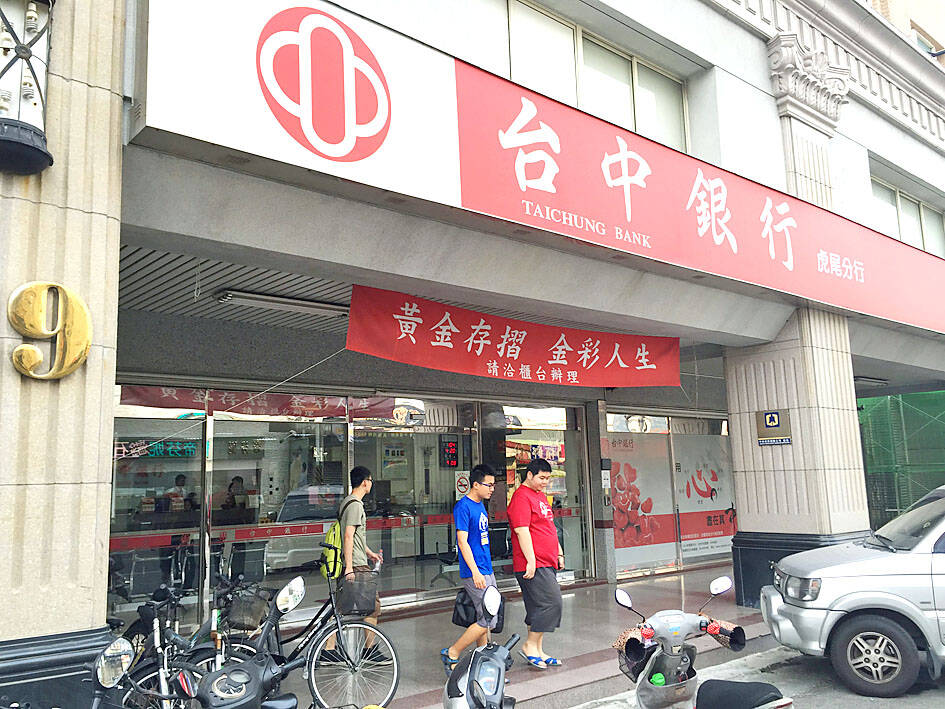Taichung Commercial Bank (TCB, 台中商銀) on Saturday said that its board of directors has approved a plan to acquire California-based American Continental Bank as part of an effort to expand its global reach.
Pending regulatory approvals, TCB said it would create a subsidiary to acquire American Continental Bancorp, the holding company of American Continental Bank, through a reverse triangular merger.
That would allow the Taiwanese bank to hold a 100 percent stake in American Continental Bancorp, it said.

Photo: CNA
TCB said it plans to acquire the US bank at US$41.48 per share, but the actual cash consideration would be determined at the deal’s close.
The cash transaction is valued at about US$82.1 million, based on the US$41.48 per share price calculated as of June 30, American Continental Bancorp said in a statement on Friday.
The transaction is expected to be competed early in the first quarter of next year, the statement said.
Founded in 2003 and based in eastern Los Angeles County, the bank primarily offers loans related to commercial real estate, small businesses, construction and residential mortgages.
Separately, the US was the largest debtor to Taiwan’s banking sector for the 28th consecutive quarter as of the end of June, with its exposure rising about 6 percent from a quarter earlier, the central bank said on Friday.
Central bank data show that outstanding claims by Taiwan’s banking sector to the US on a direct risk basis totaled US$132.63 billion as of June 30, up by US$7.25 billion, or 5.78 percent, from a quarter earlier.
The interest rate hikes this year by the US Federal Reserve raised US Treasury and bond yields, resulting in an increase in Taiwanese banks’ holdings of US debt, the central bank said.
Meanwhile, China remained the second-largest debtor to Taiwanese banks as of the end of June, with exposure of US$52.35 billion, which was a quarterly drop of US$4.42 billion, or 7.79 percent, the central bank said, attributing the decline to a stronger US dollar.
Hong Kong was in third spot, with exposure of US$35.91 billion, followed by Luxembourg with US$33.67 billion, Japan with US$29.02 billion and Australia with US$28.89 billion, the central bank data show.
Vietnam, in seventh place, showed a quarterly 8.10 percent debt increase to US$18.24 billion, as Taiwanese investors have been attracted to the Southeast Asian country amid restructuring of the global supply chain, the central bank said.
In eighth place was Singapore, with exposure of US$18.18 billion as of June 30, followed by the Cayman Islands with US$17.89 billion and the UK with US$16.97 billion, the data show.
The top 10 debtors accounted for 73.87 percent of Taiwanese banks’ outstanding international claims at the end of June, with their exposure reaching US$383.70 billion, the central bank said.

Intel Corp chief executive officer Lip-Bu Tan (陳立武) is expected to meet with Taiwanese suppliers next month in conjunction with the opening of the Computex Taipei trade show, supply chain sources said on Monday. The visit, the first for Tan to Taiwan since assuming his new post last month, would be aimed at enhancing Intel’s ties with suppliers in Taiwan as he attempts to help turn around the struggling US chipmaker, the sources said. Tan is to hold a banquet to celebrate Intel’s 40-year presence in Taiwan before Computex opens on May 20 and invite dozens of Taiwanese suppliers to exchange views

Application-specific integrated circuit designer Faraday Technology Corp (智原) yesterday said that although revenue this quarter would decline 30 percent from last quarter, it retained its full-year forecast of revenue growth of 100 percent. The company attributed the quarterly drop to a slowdown in customers’ production of chips using Faraday’s advanced packaging technology. The company is still confident about its revenue growth this year, given its strong “design-win” — or the projects it won to help customers design their chips, Faraday president Steve Wang (王國雍) told an online earnings conference. “The design-win this year is better than we expected. We believe we will win

Chizuko Kimura has become the first female sushi chef in the world to win a Michelin star, fulfilling a promise she made to her dying husband to continue his legacy. The 54-year-old Japanese chef regained the Michelin star her late husband, Shunei Kimura, won three years ago for their Sushi Shunei restaurant in Paris. For Shunei Kimura, the star was a dream come true. However, the joy was short-lived. He died from cancer just three months later in June 2022. He was 65. The following year, the restaurant in the heart of Montmartre lost its star rating. Chizuko Kimura insisted that the new star is still down

While China’s leaders use their economic and political might to fight US President Donald Trump’s trade war “to the end,” its army of social media soldiers are embarking on a more humorous campaign online. Trump’s tariff blitz has seen Washington and Beijing impose eye-watering duties on imports from the other, fanning a standoff between the economic superpowers that has sparked global recession fears and sent markets into a tailspin. Trump says his policy is a response to years of being “ripped off” by other countries and aims to bring manufacturing to the US, forcing companies to employ US workers. However, China’s online warriors